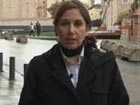| Videos | • Latest |
|
• Feature | • Sports | • Your Videos |
Syrian unrest nears year anniversary

 0 Comment(s)
0 Comment(s) Print
Print E-mail CNTV, February 21, 2012
E-mail CNTV, February 21, 2012
Syrian unrest is nearing the one year mark and February has been an intensely volatile month. High level meetings, votes on key issues and increased sactions have not altered the sharp dividision over how the crisis should be resolved. Our correspondent Stephanie Freid has more.
The cycle of violence in Syria is ongoing. Hard hit residents of Homs say the bombardment is relentless. As the unrest continues, protestors take to the streets countrywide.
In the capital Damascus, the largest turnout this weekend since the violence began 11 months ago. There have been votes, sanctions and official visits.
But a resolution seems far off. Reports of rebel forces gaining control of parts of northern Syria bolster opposition. But they say it's not enough.
Khalil Mahmoud, Syrian opposition member, said, "There are two solutions for us: Declaring a no-fly zone over Syria and providing a de-militarized zone along Turkey's border where we can train the Free Syria Army."
Turkey already hosts Syria's major opposition groups but factions are splintered. Leaders of other bordering countries have stated outright they will not play host to opposition army training camps. NATO and Western powers say they will not intervene militarily. So the opposition is lacking advantage.
Khalil Mahmoud said, "The FSA is in a tough situation. There is no financial help or weapons. And you cannot fight attack tanks with Kalachnikovs and Guns. We need heavy weapons to fight against the military."
Others say the solution doesn't lie in military force
Faysel Abdul Sater, political analyst, said, "What's happening inside Syria is small groups making problems. The true problem is countries like Turkey, Israel, America, Europe and some Arab countries pressuring Syria's government for their agendas."
That political solution, however, has been elusive. And as Syria slides towards civil war, concern is that the unrest will alter the entire region's political scheme
Faysel Abdul Sater said, "The solution in Syria has to be political. If not, there will be war in the entire region. This is obvious from government speeches we hear from Russia, Iran, the hizbolloah and the Syrian government itself."
A political solution, however, is still out of reach.
CCTV's Stephanie Freid said, "It has been a tumultuous month on the Syrian front that has included a visit to the country by China's Vice Foreign Minister, votes by the Arab League and the UN regarding Syria - The latter calling for President Assad's stepdown - and economic sanctions that analysts say are cripping the economy and affecting how the government is being run."
Solution for solving the situation differ - one came calls for a political solution without western pressure and the opposition wants military might and pressure applied to the government.
All the while, there's more protests and more people are dying.






Go to Forum >>0 Comment(s)